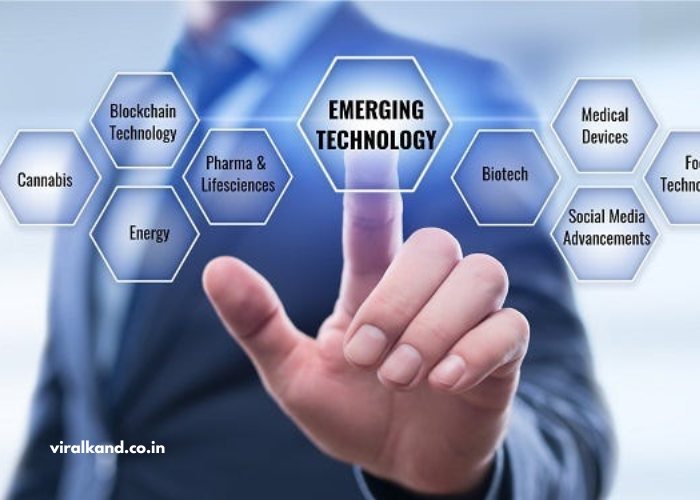In recent years, the rapid development of emerging technologies has begun to fundamentally reshape every aspect of our lives. From artificial intelligence (AI) and machine learning to blockchain and quantum computing, these advancements hold the potential to drive innovations that could change the way we work, live, and interact with the world around us. As we look towards the future, understanding the influence of these technologies is essential to harnessing their power for the benefit of society.
In this article, we will explore how emerging technologies are shaping our future and examine their potential applications in various sectors, from healthcare and education to transportation and business.
The Rise of Artificial Intelligence (AI)
The Power of AI in Automating Tasks
Artificial intelligence is perhaps one of the most transformative technologies of the 21st century. AI refers to the ability of machines and computer systems to mimic human cognitive functions, such as learning, problem-solving, and decision-making. It has already started revolutionizing industries by automating routine tasks, enabling more efficient workflows, and offering enhanced decision-making capabilities.
In the business world, AI has made significant strides in automating customer service through chatbots and virtual assistants. These systems can handle customer inquiries, resolve issues, and provide personalized recommendations, reducing the need for human intervention and improving the customer experience. Additionally, AI-driven predictive analytics is enabling companies to anticipate market trends, optimize supply chains, and improve decision-making processes.
AI’s Role in Healthcare
The healthcare industry is another area where AI is making a profound impact. Machine learning algorithms can analyze vast amounts of medical data, enabling doctors to diagnose diseases more accurately and at earlier stages. AI-powered tools are also being used to develop personalized treatment plans based on an individual’s genetic profile, improving the effectiveness of treatments and minimizing side effects.
Moreover, AI is enhancing drug discovery by analyzing complex datasets and identifying potential compounds that could lead to new treatments. These advancements are significantly accelerating the pace of medical research and development, promising better outcomes for patients in the future.
Blockchain Technology and the Future of Trust
Decentralized and Secure Transactions
Blockchain, the technology behind cryptocurrencies like Bitcoin, is one of the most promising innovations in recent years. Blockchain enables secure, transparent, and decentralized record-keeping, which is poised to revolutionize industries that rely on data integrity and trust. By removing the need for intermediaries, blockchain can facilitate faster, more secure transactions at a fraction of the cost.
In the financial sector, blockchain is being used to streamline payment systems and reduce fraud. Banks and financial institutions are exploring blockchain-based solutions for cross-border payments, which could potentially eliminate the need for traditional payment processors, reducing transaction fees and increasing the speed of international money transfers.
Blockchain’s Applications Beyond Finance
The potential applications of blockchain extend far beyond the world of finance. For example, in supply chain management, blockchain can ensure the traceability and authenticity of products, which is critical in industries like food safety, pharmaceuticals, and luxury goods. By using blockchain to track the journey of a product from its origin to the consumer, companies can improve transparency, reduce counterfeiting, and build trust with their customers.
In the realm of digital identity, blockchain could provide individuals with more control over their personal data. By creating a secure and immutable record of a person’s identity, blockchain could help prevent identity theft and ensure that sensitive information is shared only with authorized parties.
Quantum Computing: Unlocking New Possibilities
What is Quantum Computing?
Quantum computing is a revolutionary field that promises to radically change how we process information. Unlike classical computers, which use bits to represent data as either 0 or 1, quantum computers use quantum bits or qubits. Qubits can exist in multiple states simultaneously, thanks to a phenomenon known as superposition. This ability allows quantum computers to solve complex problems at speeds far beyond the capabilities of traditional computers.
Although quantum computing is still in its early stages, researchers believe that it has the potential to solve problems that are currently intractable for classical computers, particularly in fields like cryptography, materials science, and artificial intelligence.
Quantum Computing’s Impact on Cybersecurity
One of the most significant implications of quantum computing is its potential to break existing encryption methods that are currently used to secure sensitive data. Classical encryption techniques, such as RSA and AES, rely on the difficulty of factoring large numbers or solving complex mathematical problems. However, a sufficiently powerful quantum computer could solve these problems in a fraction of the time, rendering current encryption methods obsolete.
To counter this threat, researchers are working on developing quantum-resistant encryption algorithms that can withstand attacks from quantum computers. This field of research, known as post-quantum cryptography, is critical for ensuring the continued security of digital communications in the future.
Advancing Drug Discovery and Materials Science
In addition to its impact on cybersecurity, quantum computing holds great promise in fields like drug discovery and materials science. By simulating the behavior of molecules at the quantum level, quantum computers could accelerate the development of new pharmaceuticals, potentially leading to breakthroughs in the treatment of diseases such as cancer and Alzheimer’s.
Quantum computing could also be used to design new materials with properties that are difficult to achieve using classical methods. This could lead to innovations in industries ranging from electronics and energy storage to aerospace and manufacturing.
The Role of Internet of Things (IoT) in a Connected World
Transforming Everyday Life with IoT
The Internet of Things (IoT) refers to the network of physical devices embedded with sensors, software, and other technologies that allow them to connect and exchange data. IoT has already begun transforming how we interact with the world around us, from smart homes to connected cities. These devices are designed to collect and share data in real-time, enabling more efficient operations and improved quality of life.
In smart homes, IoT-enabled devices such as thermostats, security cameras, and voice assistants can work together to automate daily tasks, monitor energy usage, and enhance security. For example, a smart thermostat can adjust the temperature based on the homeowner’s preferences, while a security camera can send real-time alerts if it detects unusual activity.
IoT’s Impact on Healthcare and Transportation
IoT is also revolutionizing industries like healthcare and transportation. In healthcare, wearable devices like smartwatches and fitness trackers are collecting data on patients’ vital signs, helping doctors monitor chronic conditions and provide personalized care. These devices can also send alerts in real-time, enabling early intervention in emergencies.
In transportation, IoT is being used to develop autonomous vehicles, which are expected to reduce traffic accidents, improve fuel efficiency, and enhance mobility. Connected sensors and systems allow autonomous vehicles to communicate with each other and with infrastructure, such as traffic lights and road signs, to optimize routes and ensure safe travel.
The Future of Work: How Automation is Reshaping Employment
The Impact of Automation on Jobs
Emerging technologies, particularly AI and robotics, are driving automation across industries, leading to concerns about job displacement. Tasks that were once performed by humans are increasingly being taken over by machines, from manufacturing processes to customer service roles. While automation offers significant benefits in terms of efficiency and cost reduction, it also raises questions about the future of work.
However, automation is not necessarily a threat to employment. Instead, it is likely to lead to the creation of new jobs that require different skills. As routine tasks become automated, workers will be freed up to focus on more complex, creative, and strategic roles. Moreover, industries such as AI development, robotics engineering, and data analysis are expected to see significant job growth in the coming years.
The Role of Education and Reskilling
As automation continues to reshape the workforce, there will be a growing need for education and reskilling programs to help workers adapt to the changing job market. Governments, businesses, and educational institutions must work together to provide training in areas like data science, coding, and digital literacy. By investing in reskilling programs, we can ensure that workers are prepared for the jobs of the future.
Conclusion: Embracing the Future with Emerging Technologies
Emerging technologies are undoubtedly shaping the future in profound ways. From AI and blockchain to quantum computing and IoT, these innovations are transforming industries, enhancing productivity, and improving quality of life. As we look to the future, it is crucial to embrace these technologies and harness their potential to address some of the world’s most pressing challenges.
However, it is also important to approach the adoption of these technologies with caution, ensuring that their impact is positive and inclusive. By investing in education, reskilling, and responsible innovation, we can ensure that emerging technologies will not only shape the future but also create a more sustainable and equitable world for generations to come.




